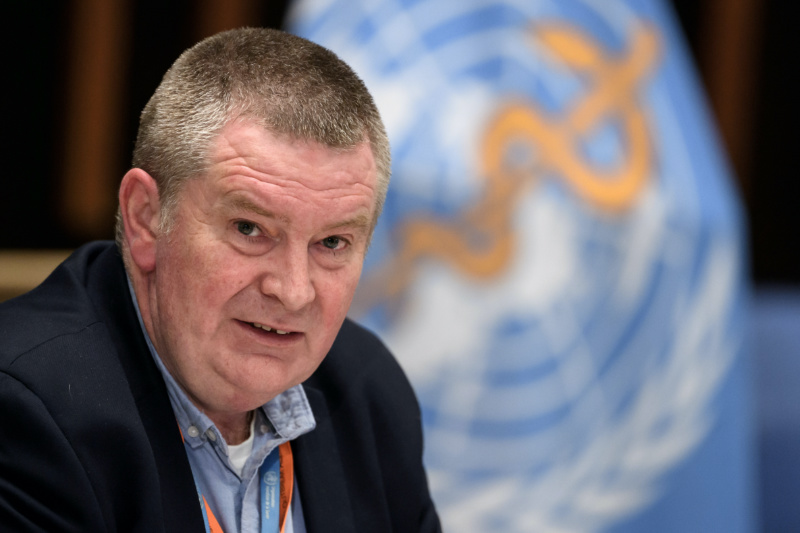Geneva, Switzerland
Reuters
Economic recovery around the world could come faster if any COVID-19 vaccine is made available to all as a public good, World Health Organization Director General Tedros Adhanom Ghebreyesus said on Thursday.
He was speaking in an online panel discussion with members of the Aspen Security Forum in the United States moderated by the NBC network.

WHO Health Emergencies Programme head Michael Ryan attends a news conference in Geneva, Switzerland, on 3rd July. PICTURE: Fabrice Coffrini/Pool via Reuters
DO YOU REALLY NEED TO PARTY? WHO ASKS WORLD’S YOUTH
Young people must curb their party instincts to help prevent new outbreaks of the COVID-19 disease, officials at the World Health Organization (WHO) pleaded on this week.
Tired of lockdowns and eager to enjoy the northern hemisphere summer, young people in some countries have been contributing to resurgences by gathering again for parties, barbecues and holidays.
Even in Geneva, where the global UN health body is based, cabarets and clubs were closed last week after evidence that nearly half of new cases were coming from there.
“Younger people also need to take on board that they have a responsibility,” said WHO emergencies chief and father-of-three Mike Ryan in an online discussion on Wednesday. “Ask yourself the question: do I really need to go to that party?”
Young people are less likely to suffer a severe form of the respiratory disease than their parents or grandparents, but the proportion of those infected aged 15 to 24 has risen three-fold in about five months, WHO data shows.
Ryan said young people were often reticent in giving their details or disclosing friends’ names to contact tracers. “It’s tough but it is what is needed to stop the virus,” he said.
Swiss newspapers said that in one night club in Zurich from which cases emerged recently, partygoers had given fake names including “Donald Duck”.
As well as reducing risks to others, WHO epidemiologist Maria Van Kerkhove said young people should be careful as even a mild version of the disease might have long-term consequences.
– EMMA FARGE, Reuters
“Sharing vaccines or sharing other tools actually helps the world to recover together. The economic recovery can be faster and the damage from COVID-19 could be less,” Tedros said.
“Vaccine nationalism is not good, it will not help us,” he said in an allusion to the competitive scramble of nations and pharmaceutical researchers to come up with an effective vaccine and order as many doses as possible in advance.
Tedros had said on Monday that while the coronavirus was the biggest health emergency since the early 20th century, the international race for a vaccine was also “unprecedented”.
“We must seize this moment to come together in national unity and global solidarity to control COVID-19,” he told Thursday’s forum. “No country will be safe until we are all safe.”
WHO emergencies director Michael Ryan, asked about a proposed Russian vaccine, told the panel that trial data was needed to ensure any vaccines are safe and effective.
Ryan also said authorities should be able to demonstrate the efficacy of a coronavirus vaccine via traditional clinical trials rather than “human challenge” studies.
He was referring to the intentional exposure of vaccinated volunteers to a virus to see whether the vaccine works.
US President Donald Trump said on Thursday it was possible the United States would have a coronavirus vaccine before the 3rd November election – a more optimistic forecast than timing put forth by his own White House health experts.
Trump has accused the WHO of becoming a puppet for China – where the coronavirus outbreak first surfaced late last year – during the COVID-19 pandemic and given notice that the United States will quit the agency in a year’s time.
The United States is the biggest overall donor to the WHO and had contributed more than $US800 million by the end of 2019 for the 2018-19 biennial funding period.
But Tedros, who has denied that the WHO answers to China or any other country, told the panel that the main damage from the Trump administration’s move to exit the Geneva-based agency would not be the loss of funding.
“The problem is not about the money, it’s not the financing…it’s actually the relationship with the US. That is more important for the WHO – the void, not the financial. And we hope then US will reconsider its position,” he said.






